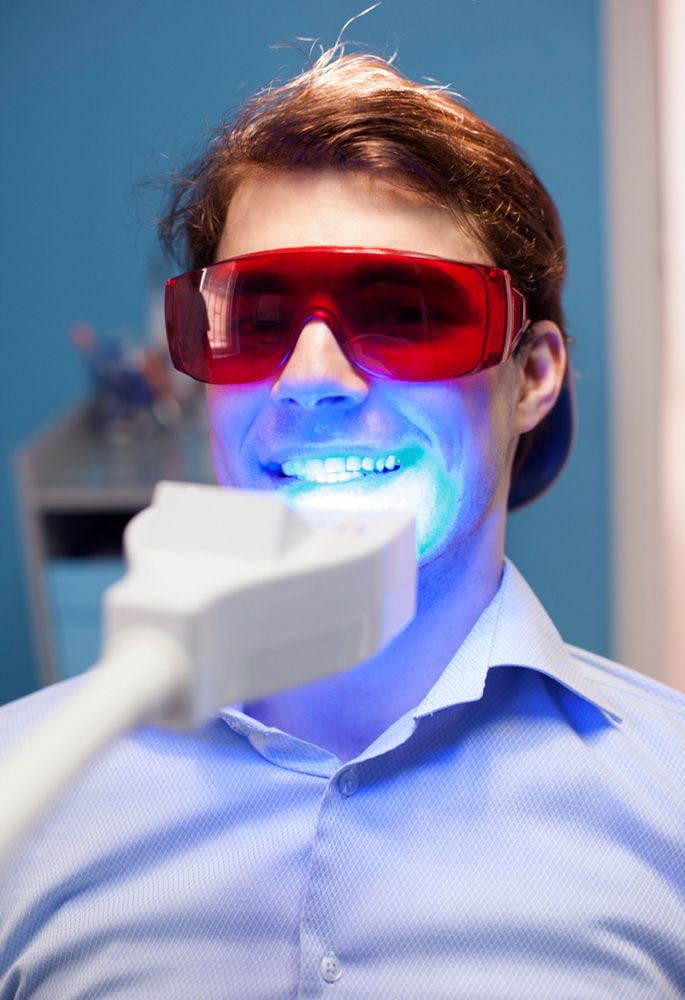Teeth Whitening Side Effects
 If you have teeth that are discolored or not as white as they could be, our Bloomington, IN cosmetic dentistry practice can help. Professional teeth whitening can bleach stains and brighten your smile, allowing you to smile with total confidence. Dr. Jay W. Chrisman and Dr. David D. Wyse have routinely achieved excellent results from teeth whitening treatment.
If you have teeth that are discolored or not as white as they could be, our Bloomington, IN cosmetic dentistry practice can help. Professional teeth whitening can bleach stains and brighten your smile, allowing you to smile with total confidence. Dr. Jay W. Chrisman and Dr. David D. Wyse have routinely achieved excellent results from teeth whitening treatment.
While teeth whitening is effective and minimally invasive, there are some minor side effects after the procedure. Let’s cover some of the basics regarding teeth whitening treatment below.
Tooth Sensitivity
After undergoing teeth whitening, your teeth will be sensitive to hot and cold temperatures as well any pressure exerted on the teeth. This is normal, and is caused by the bleaching agent penetrating through the tooth enamel. The bleaching agent gets close to the dentinal tubules of the dentin layer of the tooth. These pores in the dentin lead into the root of the tooth, where nerves and pulp are located.
Gum Sensitivity
In addition tooth sensitivity, it is possible to experience gum sensitivity after teeth whitening treatment. This only occurs if the bleaching agent winds up on the gums themselves. This is why it is crucial to keep the bleaching agent only on the teeth when possible.
How Long Do the Side Effects Last?
Typically, tooth sensitivity and gum sensitivity only last for a few days, with the issues most pronounced in the first day or so after teeth whitening treatment. While there may be some discomfort, the side effects are usually quite manageable.
Tips for Dealing with These Side Effects at Home
It’s usually pretty easy to manage these side effects from teeth whitening. Some solid advice to consider includes:
- Avoid Hot/Cold Temperature Foods and Drinks - Since hot and cold temperatures result in sensitive teeth, be sure to stick with food items that are room temperature in the first days after teeth whitening treatment.
- Eat Foods That Are Soft and Easy to Chew - To avoid tooth sensitivity from pressure, be sure to have foods that are soft or easy to chew. Save crunchy fruits/vegetables and tough meats for meals after your teeth are no longer sensitive.
- Use a Toothpaste for Sensitive Teeth - Brushing and flossing is still essential after you have teeth whitening. To make brushing less uncomfortable, use a toothpaste that is designed for sensitive teeth. You’ll appreciate the difference this simple move can make.
How In-Office Whitening Helps Reduce Side Effects
One key advantages to professional in-office teeth whitening is our ability to reduce the severity of teeth whitening side effects. This can be accomplished a few different ways.
- Professionally Administered and Supervised Treatment - Since the teeth whitening procedure is performed in the office by skilled professionals, that means the treatment is never excessive, and the bleaching agent will only be in place as long as the treatment requires. This professional supervision keeps the bleaching agent in the right place, away from the gums and other soft tissues of the mouth.
- Use of Tooth Desensitizer - Following teeth whitening treatment, tooth desensitizer is placed on the teeth. This helps cut down on the amount of tooth sensitivity patients experience in the first day of treatment, which is when the side effects of tooth sensitivity are most pronounced.
Learn More About Teeth Whitening
For more information about teeth whitening treatment and how it can benefit you, be sure to contact our experienced cosmetic and restorative dentists. The team at Chrisman & Wyse is here to help you smile with renewed confidence. You can reach us by phone at (309) 663-6393.



